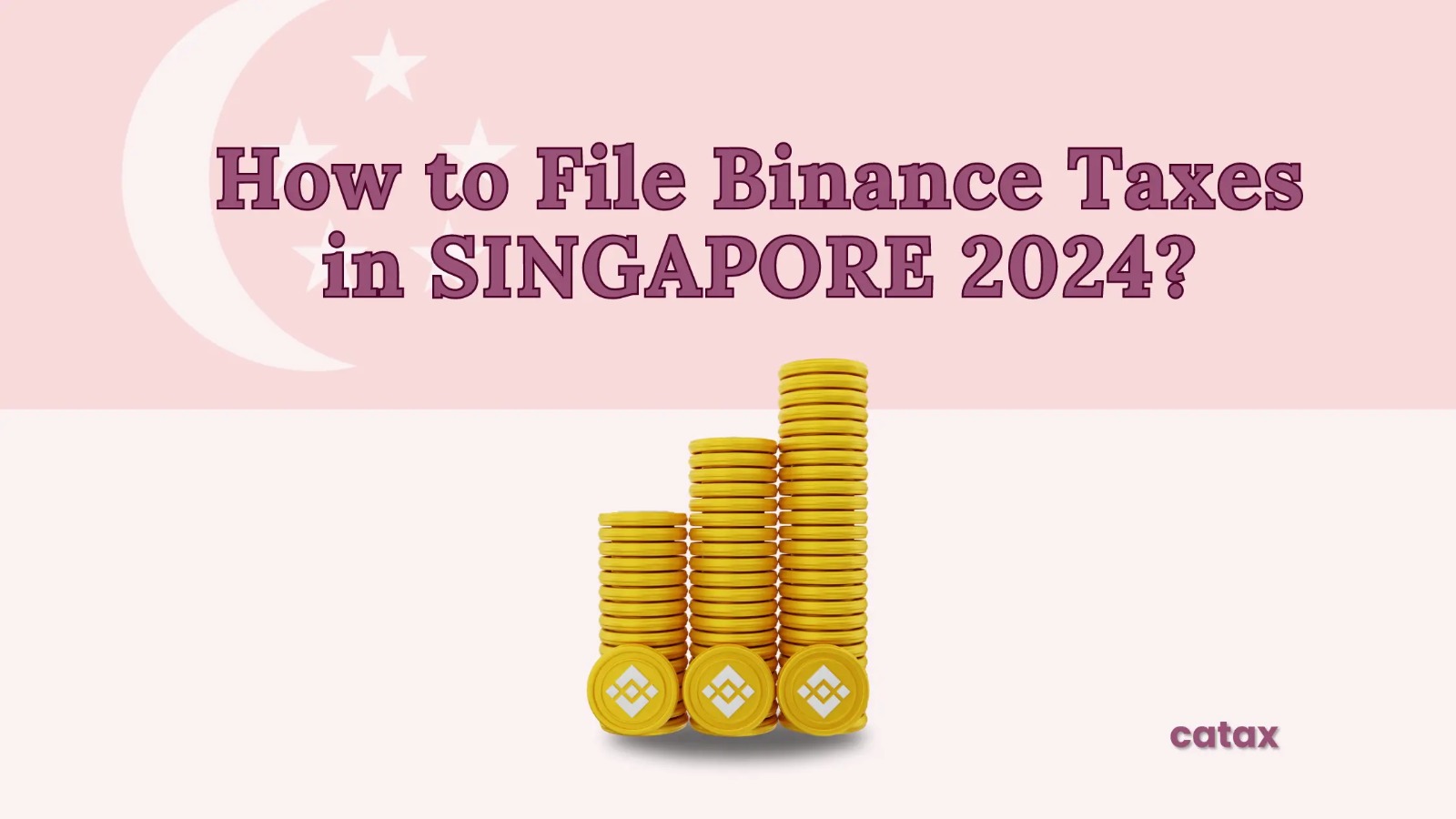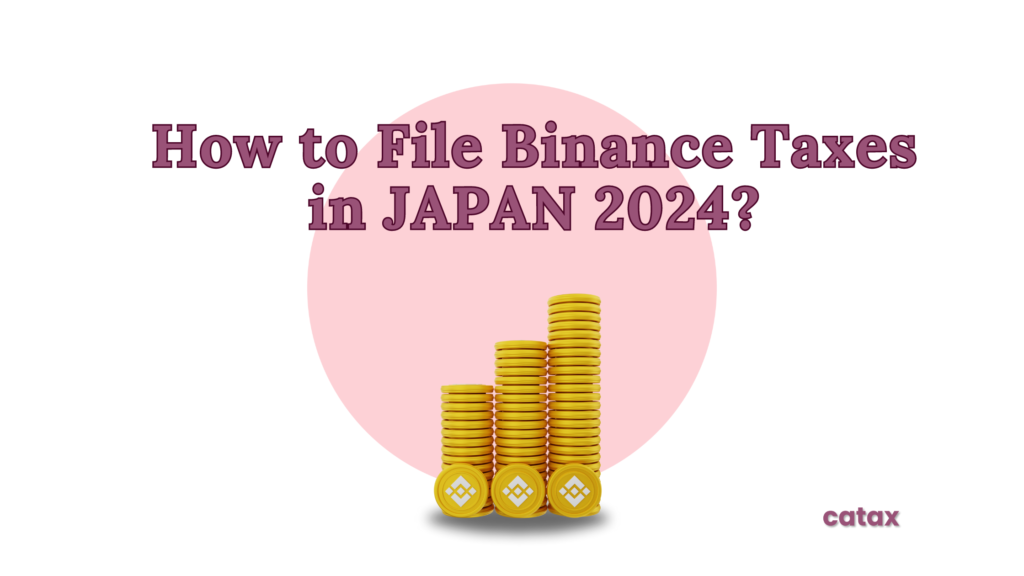This guide helps you figure out and calculate Binance taxes in Singapore. It gives you clear and simple instructions, making it easy to go through the process accurately. Singapore is one of the best places for cryptocurrency investors in the world. Consequently, this is a reason why many cryptocurrency startups are present here. Its rules and tax laws make it a friendly place for cryptocurrency investors.
- How to do your Binance taxes with simple and Easy Steps?
- When do you have to pay taxes in Singapore?
- How is crypto taxed in Singapore?
- Tax rates in Singapore
- When will taxes consider my trading activity as a business?
- Deadline for crypto taxes to file Binance tax in Singapore
- Digital payment token in Singapore
- In Singapore, how is cryptocurrency tax reported?
- How can I reduce my crypto tax in Singapore?
- What are the possible issues with Singapore’s current laws?
- Conclusion
- Frequently Asked Questions (FAQs)

How to do your Binance taxes with simple and Easy Steps?
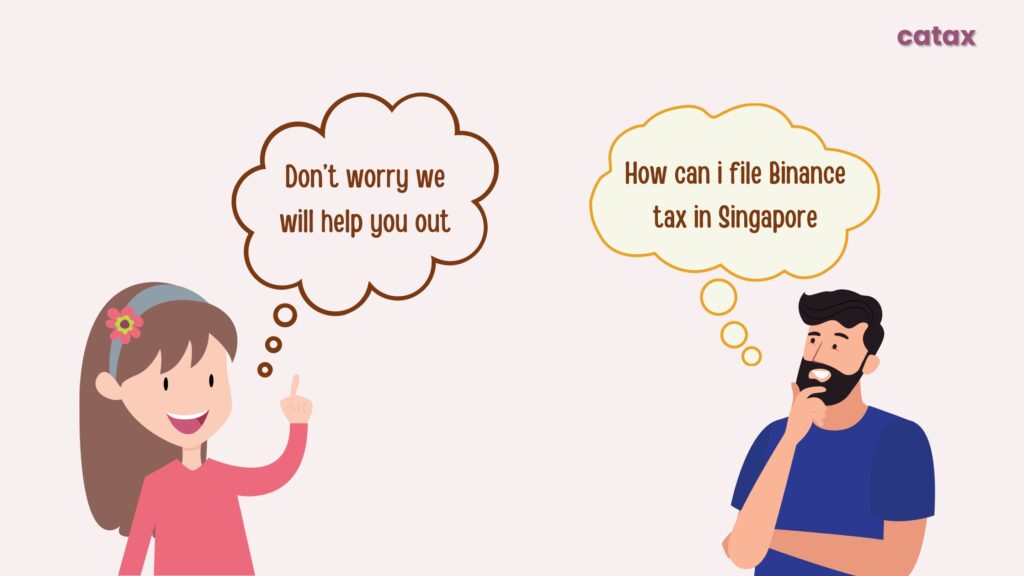
Connect Your Binance Account: Start by connecting Catax to your Binance account. Usually, using API keys accomplishes this, securing the connection.
Import Transactions: Catax will take over, automating the importation of your transaction history from Binance. Make sure it correctly imports all trades, deposits, and withdrawals.
Review Transactions: Spend time checking the transactions, ensuring no discrepancies or missing entries exist.
Choose the Appropriate Tax Year: Pick the tax year you want to calculate crypto taxes for.
Generate Tax Report: Let Catax do the calculations, producing a detailed tax report that aligns with the Inland Revenue Authority of Singapore (IRAS).
Review the Report: Carefully review the generated report, looking for accuracy. Ensure there are no mistakes or areas needing correction.
Submission to IRAS: After ensuring the report’s accuracy and completeness, submit it to the IRAS as part of your tax return.
When do you have to pay taxes in Singapore?
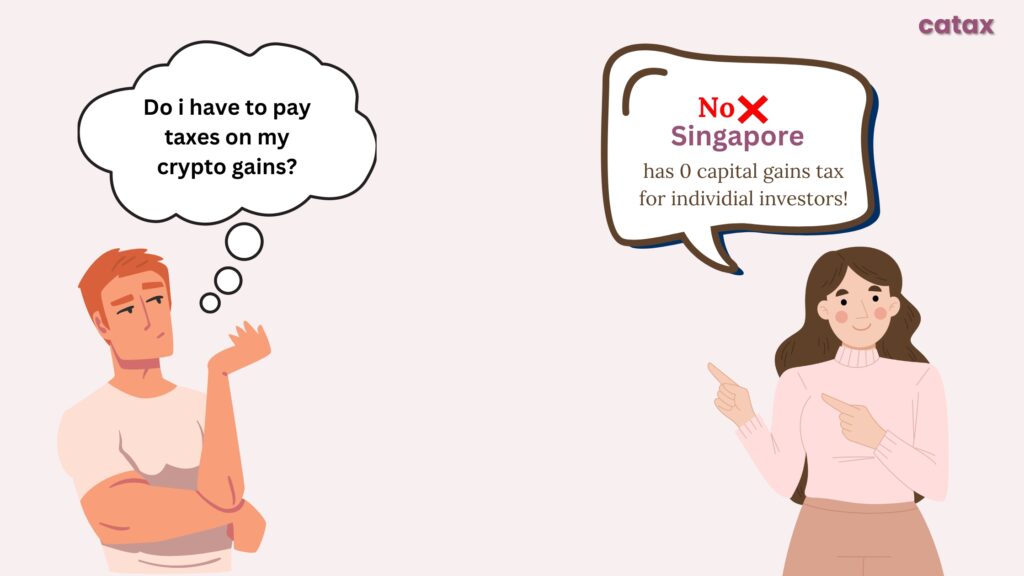
In Singapore, capital gains from cryptocurrency are not taxed, benefiting investors. However, income from crypto trading or payments for services is subject to income tax. If you live in Singapore, your income tax can be anywhere from 0% to 22%. Non-residents earning in Singapore face a flat 15% tax on work income, while other incomes are taxed at 22%. These tax structures, along with favorable regulations, make Singapore attractive for crypto investors and related businesses.
How is crypto taxed in Singapore?
To file Binance taxes in Singapore, know that the taxation of cryptocurrencies in Singapore depends on the nature of the income and activities involved. Here’s a simplified overview:
- Capital Gains: Singapore does not impose a capital gains tax, so gains from the sale of cryptocurrencies are generally not taxed. This is a key advantage for investors in the country.
- Income Tax: If you are trading cryptocurrencies as a business or receiving cryptocurrencies as payment for goods and services, the income is subject to income tax. The intention behind the purchase and use of cryptocurrencies is crucial in determining their tax treatment. Buying cryptocurrencies with the intention of long-term investment may render any gains from their disposal non-taxable. However, frequently buying and selling cryptocurrencies for profit classifies it as a trading activity, making the profits taxable.
- Goods and Services Tax (GST): As of the latest updates, Singapore has exempted digital payment tokens from GST to encourage their adoption, which includes cryptocurrencies used for payment.
- Tax Rates: For residents, income tax rates range from 0% to 22%. Non-residents in Singapore pay a flat 15% tax on employment income or 22% on other types of income.
In Singapore, the tax on crypto-related income hinges on the nature of the activities and the intentions behind the transactions. Regular trading activities aimed at profit generation are subject to income tax, while capital gains from the sale of cryptocurrencies are not taxed.
Tax rates in Singapore
When it comes to Binance taxes in Singapore, there’s no capital gains tax. If you invest through an exchange, gains are typically untaxed. But if your exchange activities are considered trading or business, income tax applies. factors like transaction frequency and intention at purchase determine the tax treatment. Moreover, Singapore’s income tax rates for residents vary from 0% to 22%. Furthermore, non-residents pay a 15% flat rate or progressive resident rates on employment income, whichever is higher, and 22% on other incomes.
| Type of Income | Description | Tax Rate for Residents | Tax Rate for Non-Residents |
|---|---|---|---|
| Business Income | Profits from trading or business activities involving cryptocurrencies | Progressive rates from 0% to 22% | Employment income: Flat rate of 15% or progressive resident rates (whichever is higher), Other income: 22% |
Remember, It’s crucial for crypto exchange investors to accurately determine the nature of their crypto activities and consult with tax professionals if needed, to ensure compliance with Singapore’s tax laws.
When will taxes consider my trading activity as a business?
Your trading activity in Singapore is considered at the business level for tax purposes when it meets certain criteria that classify it as trading rather than investment. Some factors that may indicate your trading activity has reached a business level include:
- Frequency of Transactions: If you are making frequent and regular transactions in cryptocurrencies, it may suggest a trading pattern consistent with running a business rather than investing.
- Intentions at the Time of Purchase: If your primary intention when buying cryptocurrencies is to sell them for profit rather than holding them for the long term, it could indicate a trading activity.
- Nature of Activities: Engaging in activities such as market analysis, setting targets for buying and selling, and actively managing your portfolio to generate profits is indicative of trading as a business.
- Extent of Involvement: If your involvement in crypto trading is substantial, requiring significant time, effort, and resources, it may be considered a business activity.
- Regularity and Systematic Approach: If you have established a systematic approach to trading, including strategies, risk management, and record-keeping practices, it suggests a business-like operation.
Each case is assessed on its unique circumstances; however, without a universal threshold. If your trading aligns with certain characteristics, Singapore may tax it as a business activity. Therefore, it’s advisable to consult with tax professionals for personalized guidance tailored to your situation.
Deadline for crypto taxes to file Binance tax in Singapore
In Singapore, the deadline for filing taxes on business income from crypto trading aligns with the standard tax filing schedule. For individuals, the typical deadline is April 18th, while companies may have different deadlines based on their financial year-end. It’s essential to confirm the specific deadline applicable to your situation and ensure compliance with the Inland Revenue Authority of Singapore (IRAS) regulations. Missing the deadline may result in penalties, so staying informed and seeking guidance from tax professionals is advisable.
Digital payment token in Singapore
In Singapore, digital payment tokens (DPTs) encompass cryptocurrencies used for transactions. This includes the Binance taxes in Singapore. Furthermore, the Monetary Authority of Singapore (MAS) governs DPT activities under the Payment Services Act. This act covers services like account issuance, money transfers domestically and internationally, and merchant acquisition. Consequently, this regulation aims to secure Singapore’s financial system and promote digital payment innovation. MAS further supports experimentation in the DPT realm through regulatory sandbox frameworks, reinforcing Singapore’s position as a fintech hub.
In Singapore, how is cryptocurrency tax reported?
To report Binance taxes in Singapore, it’s crucial to follow the IRAS e-Tax Guides issued between 19 November 2019 and 17 April 2020. These documents explain the treatment of income tax and GST for cryptocurrencies, highlighting the tax obligations for trading digital tokens. Singapore subjects profits from such trading to taxation if they are deemed revenue in nature. However, gains considered capital in nature are not subject to income tax. Additionally, since 1 January 2020, the use of digital payment tokens, which serve mainly as a medium of exchange, is exempt from GST. It is essential to distinguish between capital and revenue gains by conducting the “badges of trade” assessment. For comprehensive understanding and compliance, we recommend consulting IRAS’s specific e-tax Guides on Digital Payment Tokens and Income Tax Treatment of Digital Tokens.
How can I reduce my crypto tax in Singapore?
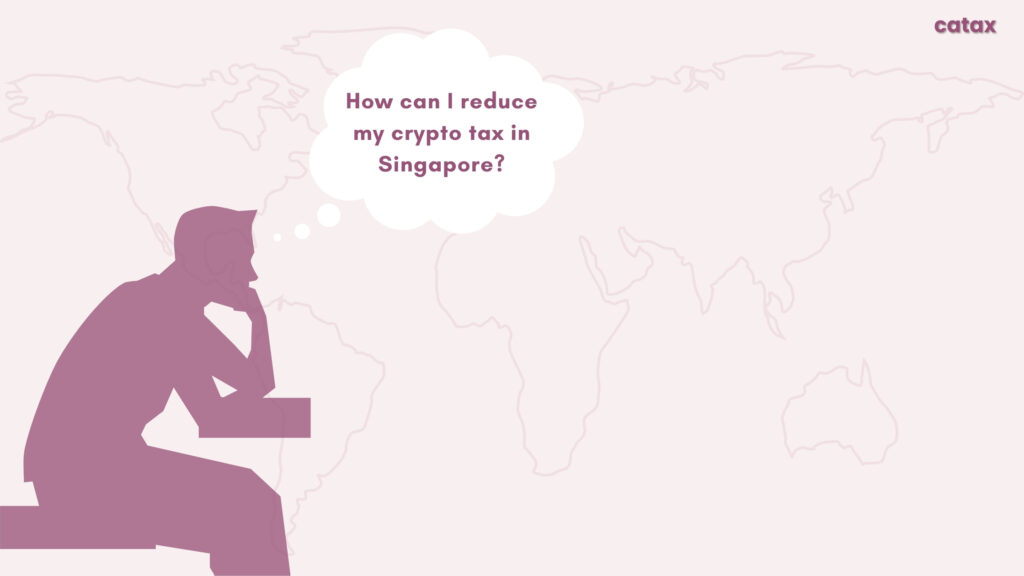
To reduce your Binance taxes in Singapore, understand crypto tax implications and leverage Inland Revenue Authority of Singapore (IRAS) deductions and reliefs. Here’s a guide:
- Identify Taxable Events: Tax applies when you convert cryptocurrencies, use them to purchase goods or services, or earn from mining, staking, or yield farming. Buying and holding crypto doesn’t incur tax.
- Maintain Accurate Records: Log every crypto transaction, including purchases, sales, receipts, airdrops, and rewards. This is vital for calculating your taxes correctly.
- Calculate Your Cost Basis: Find out the original cost of your cryptocurrencies plus any related fees. This helps in figuring out your profits or losses.
- Choose a Costing Method: Singapore generally uses the First-In, First-Out (FIFO) method for tax calculations. Sometimes, other methods like Last-In, First-Out (LIFO) may apply.
- Use Deductions and Reliefs: Claim deductions for business expenses if you trade crypto actively. Personal reliefs, like earned income or handicapped spouse relief, can lower your taxable income. Carry forward any trading losses to reduce future gains.
- Understand Tax Exemptions: Crypto payments for goods or services and certain utility tokens are exempt from the standard 8% Goods and Services Tax (GST).
- File Taxes Correctly: Report all your crypto-related earnings on your tax returns to avoid fines. The tax year in Singapore aligns with the calendar year, with returns due by April 15 (or April 18 if filed electronically).
- Review Mining and Staking: Earnings from mining or staking as a hobby are tax-exempt. If done as a business for profit, they’re taxable.
By staying informed and carefully planning, you can potentially reduce your tax obligations while complying with Singapore’s regulations. Consulting a tax professional for tailored advice is always wise.
What are the possible issues with Singapore’s current laws?
Singapore’s cryptocurrency laws aim to balance between fostering innovation and ensuring regulatory compliance, presenting both challenges and opportunities for the crypto sector. One major hurdle is banking challenges for crypto businesses. Banks in Singapore have been hesitant to serve cryptocurrency operators, citing concerns about money laundering and terrorism financing. Despite efforts by the Monetary Authority of Singapore (MAS) to facilitate banking relationships for these businesses, access remains inconsistent. Additionally, with stringent due diligence processes in place, some businesses still struggle to secure banking services..
The proposed Omnibus Act could grant MAS more power to ban crypto businesses and impose heavy fines for risk management failures. Consequently, this heightened regulatory oversight might deter startups seeking a flexible regulatory environment. Additionally, the Omnibus Act aims to extend Singapore’s regulatory reach to overseas crypto firms, requiring them to meet the same regulatory standards as domestic operations. This global approach to regulation could complicate operations for Singapore-based crypto businesses with international activities.
Singapore’s welcoming stance and clear PSA regulations encourage fintech growth—furthermore, MAS’s backing of blockchain and crypto startups positions Singapore as a global crypto hub. In addition, the licensing regime introduced under the PSA enhances consumer confidence in crypto businesses and facilitates access to traditional banking services. Moreover, the introduction of Anti-Money Laundering and Counter Financing of Terrorism (AML/CFT) provisions under the PSA aims to mitigate financial crime risks, promoting best practices among crypto businesses.
Singapore’s crypto regulations offer both challenges and opportunities. Banking issues and MAS’s broad powers present hurdles. Yet, these rules also foster innovation and industry growth within a supportive, clear regulatory framework.
Conclusion
In Singapore, the appeal of crypto investments is bolstered by its tax laws and global hub status. Moreover, connecting Catax to Binance streamlines Binance taxes in Singapore by automating transaction history importation. This process ensures accurate reviews of transactions and proper selection of tax years, ultimately generating detailed tax reports for IRAS submission.
Frequently Asked Questions (FAQs)
Capital Gains: Not taxed.
Income Tax: This applies if trading crypto as a business or receiving crypto as payment.
GST: Digital payment tokens are exempt from GST.
When trading involves frequent transactions, profit motive at purchase, substantial involvement, and a systematic approach, it constitutes a business.
The typical deadline for individuals is April 18th. Companies may have different deadlines based on their financial year-end.
The Monetary Authority of Singapore (MAS) regulates cryptocurrencies used for transactions and transfers of value under the Payment Services Act.
You must pay income tax on profits from trading cryptocurrency as part of a business or receiving crypto for goods and services. Tax authorities do not tax capital gains from crypto.
